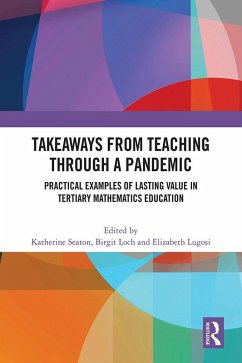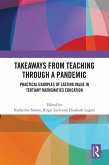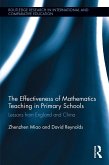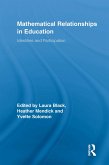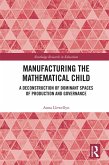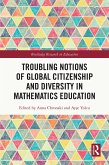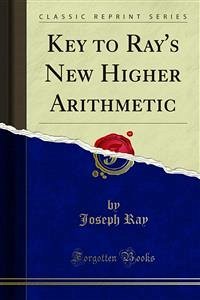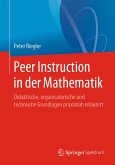Takeaways from Teaching through a Pandemic (eBook, PDF)
Practical Examples of Lasting Value in Tertiary Mathematics Education
Redaktion: Seaton, Katherine; Lugosi, Elizabeth; Loch, Birgit
52,95 €
52,95 €
inkl. MwSt.
Sofort per Download lieferbar

26 °P sammeln
52,95 €
Als Download kaufen

52,95 €
inkl. MwSt.
Sofort per Download lieferbar

26 °P sammeln
Jetzt verschenken
Alle Infos zum eBook verschenken
52,95 €
inkl. MwSt.
Sofort per Download lieferbar
Alle Infos zum eBook verschenken

26 °P sammeln
Takeaways from Teaching through a Pandemic (eBook, PDF)
Practical Examples of Lasting Value in Tertiary Mathematics Education
Redaktion: Seaton, Katherine; Lugosi, Elizabeth; Loch, Birgit
- Format: PDF
- Merkliste
- Auf die Merkliste
- Bewerten Bewerten
- Teilen
- Produkt teilen
- Produkterinnerung
- Produkterinnerung

Bitte loggen Sie sich zunächst in Ihr Kundenkonto ein oder registrieren Sie sich bei
bücher.de, um das eBook-Abo tolino select nutzen zu können.
Hier können Sie sich einloggen
Hier können Sie sich einloggen
Sie sind bereits eingeloggt. Klicken Sie auf 2. tolino select Abo, um fortzufahren.

Bitte loggen Sie sich zunächst in Ihr Kundenkonto ein oder registrieren Sie sich bei bücher.de, um das eBook-Abo tolino select nutzen zu können.
In this insightful volume, more than 50 educators from 4 continents outline thoughtful and intentional innovations of lasting value made in their teaching of tertiary mathematics and statistics, in response to COVID -19 pandemic-related campus closures.
- Geräte: PC
- mit Kopierschutz
- eBook Hilfe
Andere Kunden interessierten sich auch für
![Takeaways from Teaching through a Pandemic (eBook, ePUB) Takeaways from Teaching through a Pandemic (eBook, ePUB)]() Takeaways from Teaching through a Pandemic (eBook, ePUB)52,95 €
Takeaways from Teaching through a Pandemic (eBook, ePUB)52,95 €![The Effectiveness of Mathematics Teaching in Primary Schools (eBook, PDF) The Effectiveness of Mathematics Teaching in Primary Schools (eBook, PDF)]() Zhenzhen MiaoThe Effectiveness of Mathematics Teaching in Primary Schools (eBook, PDF)46,95 €
Zhenzhen MiaoThe Effectiveness of Mathematics Teaching in Primary Schools (eBook, PDF)46,95 €![Mathematical Relationships in Education (eBook, PDF) Mathematical Relationships in Education (eBook, PDF)]() Mathematical Relationships in Education (eBook, PDF)56,95 €
Mathematical Relationships in Education (eBook, PDF)56,95 €![Manufacturing the Mathematical Child (eBook, PDF) Manufacturing the Mathematical Child (eBook, PDF)]() Anna LlewellynManufacturing the Mathematical Child (eBook, PDF)44,95 €
Anna LlewellynManufacturing the Mathematical Child (eBook, PDF)44,95 €![Troubling Notions of Global Citizenship and Diversity in Mathematics Education (eBook, PDF) Troubling Notions of Global Citizenship and Diversity in Mathematics Education (eBook, PDF)]() Troubling Notions of Global Citizenship and Diversity in Mathematics Education (eBook, PDF)42,95 €
Troubling Notions of Global Citizenship and Diversity in Mathematics Education (eBook, PDF)42,95 €![Key to Ray's New Higher Arithmetic (eBook, PDF) Key to Ray's New Higher Arithmetic (eBook, PDF)]() Joseph RayKey to Ray's New Higher Arithmetic (eBook, PDF)7,85 €
Joseph RayKey to Ray's New Higher Arithmetic (eBook, PDF)7,85 €- -20%11
![Peer Instruction in der Mathematik (eBook, PDF) Peer Instruction in der Mathematik (eBook, PDF)]() Peter RieglerPeer Instruction in der Mathematik (eBook, PDF)19,99 €
Peter RieglerPeer Instruction in der Mathematik (eBook, PDF)19,99 € -
-
-
In this insightful volume, more than 50 educators from 4 continents outline thoughtful and intentional innovations of lasting value made in their teaching of tertiary mathematics and statistics, in response to COVID -19 pandemic-related campus closures.
Dieser Download kann aus rechtlichen Gründen nur mit Rechnungsadresse in A, B, BG, CY, CZ, D, DK, EW, E, FIN, F, GR, HR, H, IRL, I, LT, L, LR, M, NL, PL, P, R, S, SLO, SK ausgeliefert werden.
Produktdetails
- Produktdetails
- Verlag: Taylor & Francis eBooks
- Seitenzahl: 202
- Erscheinungstermin: 1. Februar 2024
- Englisch
- ISBN-13: 9781003838210
- Artikelnr.: 69595123
- Verlag: Taylor & Francis eBooks
- Seitenzahl: 202
- Erscheinungstermin: 1. Februar 2024
- Englisch
- ISBN-13: 9781003838210
- Artikelnr.: 69595123
- Herstellerkennzeichnung Die Herstellerinformationen sind derzeit nicht verfügbar.
Katherine Seaton (FAustMS, SFHEA) is currently Adjunct Associate Professor at La Trobe University, Australia, following twenty-seven years of mathematics teaching, outreach, service and research. Her publications range from statistical physics to tertiary mathematics assessment and academic integrity, and mathematical fibre art. Birgit Loch (FAustMS, PFHEA) is currently Dean of the Faculty of Science, Agriculture, Business and Law at the University of New England, Australia. With a background in computational mathematics, her research expertise is in innovation and educational technologies in tertiary STEM education. Elizabeth Lugosi is Professor at the Mathematics, Statistics, and Data Science Department of Montgomery College. She is passionate about using engagement strategies to help students succeed in mathematics courses using collaborative, active learning and evidence-based instructional practices to enhance students' problem-solving and to build community.
Introduction to takeaways from teaching through a global pandemic:
practical examples of lasting value in tertiary mathematics education 1.
Any advice? Lessons learned by mathematics lecturers for emergency remote
teaching during the COVID-19 pandemic 2. Creative approaches to teaching
mathematics education with online tools during COVID-19 3. Your online
textbook is ready: a shareable, interactive online textbook in response to
COVID-19 lockdowns 4. Stop-motion LEGO® animations for learning linear
algebra 5. Crowdsourcing solutions in the online mathematics classroom 6.
Leveraging the power of Google Apps to support active learning in a
synchronous online environment 7. Flexible, student-centred remote learning
for programming skills development 8. Don't throw the student out with the
bathwater: online assessment strategies your class won't hate 9. Forced to
improve: open book and open internet assessment in vector calculus 10. No
exam: assessment of third-year engineering students on the basis of
self-generated statistics cases 11. Utilizing discussion boards for test
questions: opportunities for students' mathematical creativity and
uniqueness 12. Mathematics assessment integrity during lockdown:
experiences in running online un-invigilated exams 13. Mathematics and
academic integrity: institutional support at a Canadian college 14.
Individualized summative assessments as used during COVID-19 15. Learning
at a distance: can at-home activities measure up? 16. Peer-Assisted
Learning in a pandemic 17. Checkpoints for online mathematics students with
learning challenges 18. Crafting connections in post-COVID classrooms:
learning university mathematics through craft 19. The pandemic as a
catalyst for rethinking active learning practices in technology intensive
instructional environments 20. The unexpected consequences of replacing
corridor chats with an online community of practice
practical examples of lasting value in tertiary mathematics education 1.
Any advice? Lessons learned by mathematics lecturers for emergency remote
teaching during the COVID-19 pandemic 2. Creative approaches to teaching
mathematics education with online tools during COVID-19 3. Your online
textbook is ready: a shareable, interactive online textbook in response to
COVID-19 lockdowns 4. Stop-motion LEGO® animations for learning linear
algebra 5. Crowdsourcing solutions in the online mathematics classroom 6.
Leveraging the power of Google Apps to support active learning in a
synchronous online environment 7. Flexible, student-centred remote learning
for programming skills development 8. Don't throw the student out with the
bathwater: online assessment strategies your class won't hate 9. Forced to
improve: open book and open internet assessment in vector calculus 10. No
exam: assessment of third-year engineering students on the basis of
self-generated statistics cases 11. Utilizing discussion boards for test
questions: opportunities for students' mathematical creativity and
uniqueness 12. Mathematics assessment integrity during lockdown:
experiences in running online un-invigilated exams 13. Mathematics and
academic integrity: institutional support at a Canadian college 14.
Individualized summative assessments as used during COVID-19 15. Learning
at a distance: can at-home activities measure up? 16. Peer-Assisted
Learning in a pandemic 17. Checkpoints for online mathematics students with
learning challenges 18. Crafting connections in post-COVID classrooms:
learning university mathematics through craft 19. The pandemic as a
catalyst for rethinking active learning practices in technology intensive
instructional environments 20. The unexpected consequences of replacing
corridor chats with an online community of practice
Introduction to takeaways from teaching through a global pandemic:
practical examples of lasting value in tertiary mathematics education 1.
Any advice? Lessons learned by mathematics lecturers for emergency remote
teaching during the COVID-19 pandemic 2. Creative approaches to teaching
mathematics education with online tools during COVID-19 3. Your online
textbook is ready: a shareable, interactive online textbook in response to
COVID-19 lockdowns 4. Stop-motion LEGO® animations for learning linear
algebra 5. Crowdsourcing solutions in the online mathematics classroom 6.
Leveraging the power of Google Apps to support active learning in a
synchronous online environment 7. Flexible, student-centred remote learning
for programming skills development 8. Don't throw the student out with the
bathwater: online assessment strategies your class won't hate 9. Forced to
improve: open book and open internet assessment in vector calculus 10. No
exam: assessment of third-year engineering students on the basis of
self-generated statistics cases 11. Utilizing discussion boards for test
questions: opportunities for students' mathematical creativity and
uniqueness 12. Mathematics assessment integrity during lockdown:
experiences in running online un-invigilated exams 13. Mathematics and
academic integrity: institutional support at a Canadian college 14.
Individualized summative assessments as used during COVID-19 15. Learning
at a distance: can at-home activities measure up? 16. Peer-Assisted
Learning in a pandemic 17. Checkpoints for online mathematics students with
learning challenges 18. Crafting connections in post-COVID classrooms:
learning university mathematics through craft 19. The pandemic as a
catalyst for rethinking active learning practices in technology intensive
instructional environments 20. The unexpected consequences of replacing
corridor chats with an online community of practice
practical examples of lasting value in tertiary mathematics education 1.
Any advice? Lessons learned by mathematics lecturers for emergency remote
teaching during the COVID-19 pandemic 2. Creative approaches to teaching
mathematics education with online tools during COVID-19 3. Your online
textbook is ready: a shareable, interactive online textbook in response to
COVID-19 lockdowns 4. Stop-motion LEGO® animations for learning linear
algebra 5. Crowdsourcing solutions in the online mathematics classroom 6.
Leveraging the power of Google Apps to support active learning in a
synchronous online environment 7. Flexible, student-centred remote learning
for programming skills development 8. Don't throw the student out with the
bathwater: online assessment strategies your class won't hate 9. Forced to
improve: open book and open internet assessment in vector calculus 10. No
exam: assessment of third-year engineering students on the basis of
self-generated statistics cases 11. Utilizing discussion boards for test
questions: opportunities for students' mathematical creativity and
uniqueness 12. Mathematics assessment integrity during lockdown:
experiences in running online un-invigilated exams 13. Mathematics and
academic integrity: institutional support at a Canadian college 14.
Individualized summative assessments as used during COVID-19 15. Learning
at a distance: can at-home activities measure up? 16. Peer-Assisted
Learning in a pandemic 17. Checkpoints for online mathematics students with
learning challenges 18. Crafting connections in post-COVID classrooms:
learning university mathematics through craft 19. The pandemic as a
catalyst for rethinking active learning practices in technology intensive
instructional environments 20. The unexpected consequences of replacing
corridor chats with an online community of practice
